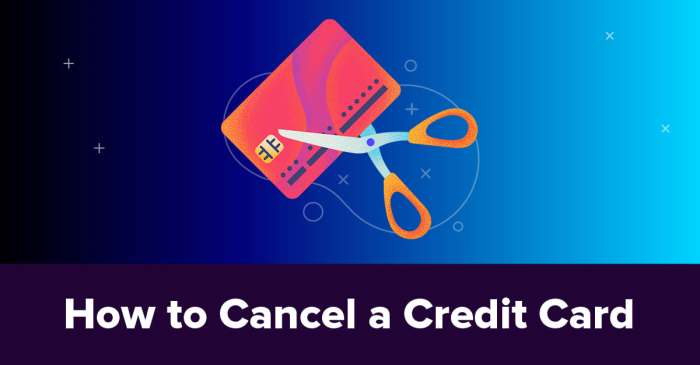
Navigating the often-complex world of credit card cancellation can be daunting. Many fear hidden fees or negative impacts on their credit score. This guide provides a clear, step-by-step approach to cancelling your credit card without incurring unnecessary charges, empowering you to make informed financial decisions.
We’ll explore various credit card issuer policies, potential fees, and effective strategies for negotiating fee waivers. Learn how to minimize the risk of penalties, understand the implications for your credit report, and discover alternative options to outright cancellation, ensuring a smooth and financially responsible transition.
Understanding Credit Card Cancellation Policies

Cancelling a credit card might seem straightforward, but understanding the associated policies and potential fees is crucial to avoid unexpected charges. Different credit card issuers have varying procedures, and the specifics can depend on the type of card you possess. This section Artikels the typical cancellation process and highlights potential fee scenarios.
Credit Card Cancellation Processes
The process of cancelling a credit card generally involves contacting your issuer directly, either by phone or through their online portal. Most issuers will require verification of your identity before processing the cancellation. You might be asked to provide personal information such as your account number, date of birth, and address. After verification, the issuer will confirm the cancellation and provide you with details about any outstanding balances or potential closing fees.
The timeframe for complete account closure can vary depending on the issuer and any outstanding transactions. Some issuers may require a specific waiting period after cancellation before closing the account completely.
Cancellation Policies for Different Card Types
Cancellation policies can differ between secured and unsecured credit cards. Secured cards, which require a security deposit, often have a simpler cancellation process. The issuer typically returns the deposit after the account is closed, although there might be a small processing fee. Unsecured cards, which don’t require a deposit, may have more complex cancellation policies, especially if you have an outstanding balance or have recently opened the account.
Prepaid cards generally have simpler cancellation procedures, often involving simply using the remaining balance.
Situations Where Cancellation Fees Might Apply
While many credit card cancellations are fee-free, certain circumstances can trigger charges. For instance, some issuers may charge an early termination fee if you cancel a card before a promotional period ends, such as a period with a low introductory APR. Another scenario is if you have an outstanding balance; the issuer might charge a fee for closing the account before settling the debt.
Additionally, some premium cards with annual fees may impose a fee for cancellation, even if you are not in a promotional period.
Comparison of Cancellation Policies
The following table compares the cancellation policies of three major credit card companies. Note that these are general examples and specific policies may vary depending on the individual card agreement. Always refer to your cardholder agreement for the most accurate and up-to-date information.
| Issuer | Fee Structure | Notice Period | Additional Requirements |
|---|---|---|---|
| Company A | No fee for most cards, potential early termination fee for promotional cards. | Typically none, but account closure may take several weeks. | Full payment of outstanding balance required. |
| Company B | No fee unless a promotional period is prematurely ended. | Generally none, but account may remain open for a short period for processing. | May require a written cancellation request. |
| Company C | May charge a fee for premium cards cancelled before a certain period. | May require a 30-day notice period for some cards. | Requires contacting customer service to initiate cancellation. |
Identifying Potential Fees Associated with Cancellation
Cancelling a credit card might seem straightforward, but it’s crucial to understand the potential fees involved to avoid unexpected charges. Different cards and issuers have varying policies, so carefully reviewing your cardholder agreement is essential. Failing to do so could result in unwanted expenses.While many credit card cancellations proceed without fees, several situations can trigger charges. Understanding these potential fees and the circumstances under which they might be waived is key to a smooth cancellation process.
Early Termination Fees
Some credit cards, particularly those with promotional offers like low introductory APRs or rewards programs, may include early termination fees. These fees are levied if you cancel the card before a specified period, often a year or more, has elapsed. The amount of the fee can vary significantly, ranging from a small percentage of your outstanding balance to a fixed dollar amount.
For example, a card might charge a $200 early termination fee if canceled within 12 months of opening. These fees are designed to compensate the issuer for the loss of potential interest income and the costs associated with the promotional offer. Such fees are often clearly stated in the terms and conditions of the card’s promotional period.
Balance Transfer Fees
While not directly a cancellation fee, balance transfer fees can indirectly impact your cancellation experience. If you’ve recently transferred a balance to your card and plan to cancel it before paying off the transferred balance, you might face additional fees. These fees are usually a percentage of the transferred amount. For instance, a 3% balance transfer fee on a $1000 balance would amount to $30.
It’s important to understand that these fees are separate from cancellation fees and will still apply even if the cancellation itself is fee-free. Therefore, paying off any transferred balance before canceling is recommended to avoid incurring these extra costs.
Situations Where Fees May Be Waived
There are circumstances where credit card issuers might waive cancellation fees. These often involve exceptional situations or demonstrating a genuine hardship. For example, if you’re experiencing significant financial difficulties and can provide documentation to support your claim, the issuer may be more willing to waive fees. Similarly, if there are issues with the card’s functionality or customer service that are the issuer’s fault, this could be a valid reason for fee waiver consideration.
It is important to contact customer service directly and clearly explain your situation. Always keep records of all communication.
Flowchart for Minimizing Cancellation Fees
The following flowchart illustrates the steps to take to minimize the risk of incurring cancellation fees.[Diagram description: The flowchart would begin with a “Start” box. This would branch into two boxes: “Review Cardholder Agreement” and “Pay Off Outstanding Balances.” The “Review Cardholder Agreement” box would lead to a “Cancellation Fees Present?” box. A “Yes” answer would lead to a “Contact Customer Service to Negotiate” box, while a “No” answer would lead to a “Proceed with Cancellation” box.
The “Pay Off Outstanding Balances” box would lead directly to the “Proceed with Cancellation” box. Both “Contact Customer Service to Negotiate” and “Proceed with Cancellation” boxes lead to an “End” box.]This flowchart highlights the importance of proactive steps to avoid unexpected fees when canceling a credit card. Careful review of your agreement and prompt action are crucial in minimizing the risk.
Strategies for Cancelling a Credit Card Without Fees

Cancelling a credit card can sometimes involve unexpected fees. However, there are strategies you can employ to potentially avoid these charges. Understanding your rights and employing effective communication techniques are key to a successful, fee-free cancellation. This section Artikels methods for negotiating with your credit card issuer and provides a step-by-step guide to requesting cancellation.Negotiating with your credit card issuer to waive cancellation fees often hinges on demonstrating loyalty or highlighting dissatisfaction.
Many issuers are more willing to compromise than to lose a long-term customer. Similarly, if you’ve experienced poor service or unexpected charges, this can strengthen your negotiating position. Remember to be polite but firm in your request.
Negotiating Fee Waivers
Successfully negotiating a fee waiver often involves presenting a compelling case to the credit card issuer. This might include highlighting your long-standing relationship with the company, emphasizing any significant spending you’ve done with the card, or pointing out negative experiences that have soured your relationship with the institution. Be prepared to explain your reasons for cancellation calmly and professionally.
A well-articulated and respectful request is more likely to be met with a favorable response. For example, you could say something like, “I’ve been a loyal customer for five years, consistently paying my balance on time and maintaining a good credit score. I’m requesting a waiver of the cancellation fee as I’m closing this account due to [state your reason].”
Step-by-Step Cancellation Request
Before initiating the cancellation process, gather all necessary information, including your account number, contact information, and the reason for cancellation. This streamlined approach will make the process smoother.
- Contact Customer Service: Begin by contacting your credit card issuer’s customer service department. This can be done via phone, mail, or online chat. Clearly state your intention to cancel the account and politely inquire about any associated fees.
- Explain Your Reasons: Provide a concise explanation for your cancellation. As mentioned earlier, highlighting loyalty or negative experiences can be beneficial.
- Request a Fee Waiver: Politely but firmly request a waiver of any cancellation fees. Refer to your account history and any positive contributions you’ve made as a customer.
- Document the Conversation: Keep detailed records of your communication, including the date, time, representative’s name, and any agreements reached. This documentation will prove invaluable should any disputes arise.
- Follow Up in Writing: After your phone conversation, it’s wise to send a follow-up email or letter confirming your cancellation request and the agreement reached regarding any fees. This provides written evidence of your communication.
Comparing Cancellation Methods
Choosing the right cancellation method can influence your success in avoiding fees. Each method offers a different level of interaction and documentation.
| Method | Pros | Cons |
|---|---|---|
| Phone | Immediate interaction, opportunity for negotiation. | Difficult to document the conversation thoroughly, potential for miscommunication. |
| Provides written record of your request. | Slower process, less opportunity for immediate negotiation. | |
| Online | Convenient and often offers a clear record of your actions. | May lack the personal touch for negotiation. |
Successfully cancelling a credit card without incurring fees requires proactive planning and a clear understanding of your issuer’s policies. By following the strategies Artikeld, you can confidently navigate the cancellation process, protect your credit score, and maintain control of your finances. Remember to weigh the pros and cons of cancellation versus alternatives like lowering your credit limit or freezing your account to make the best decision for your individual circumstances.
Top FAQs
What happens to my credit score if I cancel a credit card?
Cancelling a credit card can slightly lower your credit score, primarily due to a decrease in your available credit and credit history length. However, the impact is usually minimal if your credit history is otherwise strong.
Can I cancel a credit card if I have a balance?
Yes, you can cancel a credit card even if you have an outstanding balance. However, you are still responsible for paying off the debt. Failure to do so will negatively impact your credit score and may lead to collection efforts.
What if my credit card issuer refuses to waive cancellation fees?
If negotiation fails, carefully review your cardholder agreement for any clauses related to fee waivers. Consider documenting all communication with the issuer and exploring options like filing a complaint with your state’s attorney general’s office or the Consumer Financial Protection Bureau (CFPB).
How long should I wait before closing a credit card?
There’s no magic number, but generally, it’s advisable to keep older credit cards open to maintain a longer credit history, which can positively impact your credit score. Consider keeping accounts open for at least a year or two before closing them, especially if they have a low credit utilization rate.





